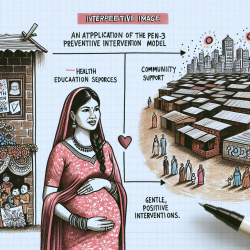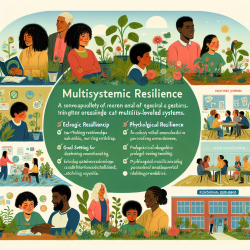Intimate partner violence (IPV) is a pervasive public health issue that affects individuals and families worldwide. The World Health Organization reports that one-third of women globally have experienced some form of IPV. This alarming statistic underscores the need for effective interventions, particularly those that are culturally sensitive and tailored to specific communities.
The PEN-3 Model: A Framework for Culturally Relevant Interventions
The PEN-3 model, developed by Professor Airhihenbuwa in 1989, provides a comprehensive framework for designing culturally relevant health interventions. It emphasizes three primary domains: health education target groups, relationships and expectations, and cultural empowerment or identity. This model is particularly effective in addressing IPV as it considers the cultural norms and values that influence behavior.
Research Insights: Reducing IPV Among Pregnant Women in Hamadan's Slum Areas
A recent study conducted in Hamadan City slum areas explored the impact of preventive interventions on IPV among pregnant women using the PEN-3 model. The study involved 150 participants divided into intervention and control groups. The intervention included education based on local cultural norms, individual and group counseling, and training for healthcare providers.
The results were promising. The intervention group showed significant improvements in knowledge, communication skills, and family support. Moreover, there was a reduction in physical, psychological, and sexual violence compared to the control group. These findings highlight the potential of culturally tailored interventions to mitigate IPV.
Practical Strategies for Practitioners
Practitioners can enhance their skills by incorporating the following strategies derived from the study:
- Cultural Sensitivity: Tailor interventions to align with local cultural norms and values. Understanding the community's belief systems can help design more effective programs.
- Education and Awareness: Increase awareness about IPV through educational sessions that address misconceptions and provide practical conflict management techniques.
- Counseling and Support: Offer both individual and group counseling sessions to provide a safe space for victims to share experiences and seek support.
- Engagement with Healthcare Providers: Train healthcare providers to recognize signs of IPV and offer appropriate support and referrals.
- Nurturing Support Networks: Encourage victims to build supportive networks within their community to foster resilience and empowerment.
The Importance of Continued Research
This study demonstrates the effectiveness of culturally sensitive interventions but also highlights areas for further research. There is a need to explore additional strategies that can be implemented in different cultural contexts to reduce IPV effectively. Practitioners are encouraged to engage in ongoing research to refine their approaches and contribute to this critical field.










